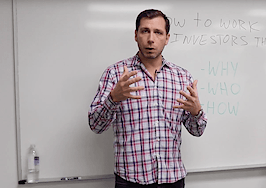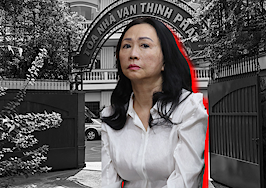It’s no secret that the most valuable real estate agents are those who have the skills and expertise to act as a one-stop shop for client needs.
As the market has become increasingly competitive, so too has the real estate industry, and differentiating your value proposition means leveraging marketing, social media strategy, SEO and market insight all in addition to basic real estate know-how.
Keeping up with market trends — and being able to explain those trends in a way that your client understands — is critical to building your business and gaining new clients.
In recent months, mortgage applications have significantly dropped while interest rates have grown increasingly higher, which may have your clients wondering:
- How will my property value be impacted?
- Is now the time to buy or sell?
- How do I get the biggest ROI in this market?
If you’re not sure how to break it down for your clients, read on for a simplified look at what rising interest rates mean for real estate investors.
ROI
Interests rates have slowly risen over the past couple of years, and they’re likely to keep going up. Although higher interest rates have their benefits — increased returns on savings accounts, more incentive for banks to lend and taming inflation — many types of real estate investments will see a significant impact.
Although there are many calculations that go into analyzing real estate investments, they mostly boil down to what the return on investment (ROI) will be.
When investors put money into real estate, they do so expecting to realize a certain return. One of the beauties of investing in real estate is that it’s one of the only investments for which an investor can easily borrow money.
When using borrowed money to invest in real estate, the idea is to get a higher return on the investment than what’s being paid in interest on the loan.
The value of investment real estate is directly related to the market’s expectation for a return on investment. The higher the return on investment needed to make money on a deal, the lower the property value becomes.
The net income of a stabilized property is relatively fixed, so the only way to increase the return is to reduce the purchase price. Because investors have been able to borrow money at low interest rates the past several years, the required return has been lower, driving investment property values up.
Cap rate
Let’s look at an example using a basic method of calculating a return on investment and property value — a capitalization rate (cap rate). Simply put, a cap rate is a percentage of the purchase price that is returned to the investor each year with the net operating income (NOI).
If an investor purchases a property for $1 million and the property has a NOI of $100,000, the cap rate would be 10 percent. This is calculated by dividing the NOI by the purchase price.
In this case, $100,000 divided by $1 million equals 0.10, or 10 percent, giving you a 10 percent cap rate.
So by this calculation, the return on investment is 10 percent.
Writer’s note: In reality, cap rates in many U.S. markets have been between 4 percent and 9 percent, depending on the local market and property type. In this case, 10 percent made for an easy calculation.
Let’s say an investor only needs to earn 8 percent on the above property. That investor can calculate how much he or she can spend by dividing the NOI by the needed cap rate.
For example, $100,000 divided by 8 percent equals $1.25 million.
If that investor needed to earn 12 percent ($100,000 divided by 12 percent), he or she would have to purchase it for $83,333.
Essentially, a higher cap rate equals a lower price.
Interest rate
So how do investors determine what rate of return they need on a property?
Besides considering the risk a particular property has, the local market outlook, etc., one of the major determining factors is the interest rate at which they can borrow the money to purchase the property.
If the loan has a 5 percent interest rate, it wouldn’t make sense for the investor to purchase a property at a price that puts it at a 4 percent cap rate. They would be losing money.
The investor needs to be able to purchase the property at a price that provides a high enough return to cover the cost of the interest on the loan as well as have enough margin to make money if there are any dips in the income or spikes in the expenses.
As interest rates continue to rise, investors will need to seek higher rates of return on their investment properties to continue making money.
As you can see from our above examples, this can only be accomplished by reducing the purchase price of a property.
To maintain the same margin between the rate on borrowed money and the rate of return received on an investment property, investors will begin demanding lower purchase prices on properties they’re acquiring.
Making long-term decisions
With investment property values likely to decrease as rates increase, investors should start making long-term decisions about their current holdings. They can sell now, while their property values are still high or continue to hold them until prices stabilize.
Investors with interest rates locked in for a long period of time are likely to choose to hold their properties longer, while others with notes due in a couple of years may choose to sell now.
Either way, there will surely be some changes in the market in regard to how and what investors are purchasing and selling.
The examples used in this article are over simplified for the sake of explaining the effect that rising interest rates will have on real estate investing without having to write a textbook — something your clients are sure to appreciate.
The required rate of return on an investment is also greatly influenced by the amount of risk the investor will be taking on by purchasing the property.
With real estate investing, there are many factors to consider when deciding whether to purchase an investment property. That’s where a skilled and savvy real estate agent comes in, and staying up-to-date on the market changes that impact your client’s bottom line is an effective way to prove that you’re the right person for the job.
Kevin Vandenboss is an an entrepreneur, real estate broker and owner of Vandenboss Commercial in Lansing, Michigan. You can follow him on Facebook or Instagram and check out his website.













